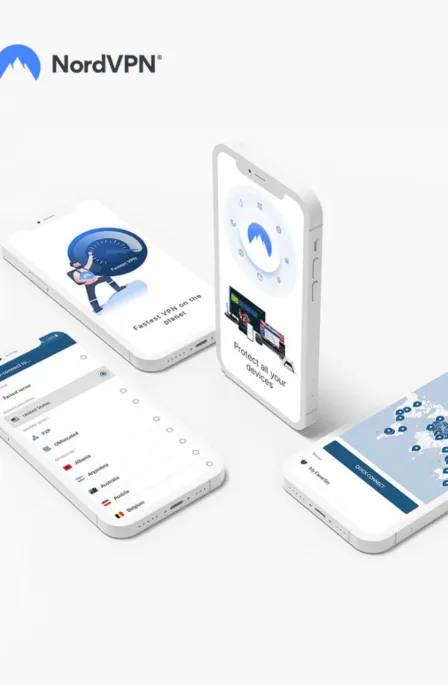Masking your IP address is necessary to protect yourself from multiple cyber threats. There are multiple ways to hide your IP address. However, below the best ones you can follow:
In today’s world, how you use the internet can be important for your security and how people perceive you. Sometimes, it is necessary to hide your IP address to do this. This guide will teach you how to hide your IP address to be more secure when using the internet.
By hiding your IP address, you can prevent somebody from monitoring your online activity, learning what sites you visit, and preventing the sites you visit from learning your physical location.
Also, by changing your IP, you can bypass the geo-restrictions that limit access to streaming media. For example, many sites like Netflix and Hulu prevent users from outside the US from accessing their sites.
What is an IP address?
An IP address is like a digital address with numbers and decimals identifying your device and location. The internet service provider assigns you an IP address to connect to the internet. You can’t connect or communicate with the internet without an IP address.
The prime purpose of the network address is to enable computing devices to communicate with the destined service or website. When you connect to the Internet, the information is sent to your IP address, which then allows you to view that particular site.
There are four types of IP addresses:
- Public IP Address: The ISP provides you with the public IP address. With a public IP address, whatever you do online is visible to your ISP, and they can also track you.
- Private IP Address: This IP address is the one that your network router assigns to your device. In other words, it is used to communicate within the same network.
- Dynamic IP Address: This is a temporary IP address assigned by the ISP. It expires when you reboot the device, a new device joins the network, or you configure your network settings.
- Static IP Address: It is a fixed IP address provided by the Dynamic Host Configuration Protocol server.
Besides this, there are two types of website IP addresses, i.e., Dedicated IP addresses and shared IP addresses, which a VPN assigns. Also, there are two main versions of IP address; IPv4 and IPv6.
7 Best ways to hide your IP address
With the gaping absence of net neutrality, cybersecurity experts and privacy advocates have devised several ways to attain online anonymity. Since hiding your IP address is one major aspect of online anonymity, several methods are available for you to opt for. Some of the best methods of hiding your IP address are as follows:
1. Using a VPN – this is the best way!
VPN is the most secure and reliable method of hiding your IP address. When you connect to a VPN, your actual IP address is masked and replaced with the IP address allocated by the VPN server. The VPN acts like a protective shield to prevent your network address from getting exposed.
6 Best VPNs – Quick list

NordVPN: It’s a top-ranked VPN provider with 6,100+ servers, robust security features, works with Netflix, Torrenting, Tor, and ISP throttling – 30-day money-back guarantee www.nordvpn.com

CyberGhost: it offers 7500+ servers worldwide, works with torrenting and Netflix, and provides excellent privacy features. 30-day Free trial available www.cyberghost.com

Surfhark: Excellent VPN for Netflix and torrenting, can bypass ISP throttling, and has great privacy features. Boasts 3,200+ servers and comes with a 30-day money-back guarantee www.surfshark.com

Proton VPN: It has 1400+ servers and is loaded with all privacy features. Works with Netflix, Torrenting, Tor, and bypassing ISP throttling. Free Version available www.protonvpn.com

ExpressVPN: It has 3,000 servers worldwide and works excellently with Torrenting, Netflix, and special features for Tor. Offers a 30-day money-back guarantee www.expressvpn.com

VyprVPN: it has 700+ servers in over 70 Countries and works great with Torrenting, Netflix, and special features for Tor. Offer 30-day Free trial available www.vyprvpn.com
Besides this, a VPN also encrypts the data into encrypted packets and routes it via an external server. This way, no one can track your online activities, including your ISP. They can only view that you’re connected to a VPN server.
A VPN’s ability to encrypt data makes it better than other methods of hiding the IP address. Other than this, a VPN also offers several other benefits. They would bypass ISP throttling while you download torrents or play games. Even with a reliable VPN, you can bypass geo-blocked restrictions and access streaming content from anywhere.
NordVPN, ExpressVPN, and Surfshark VPN are the most recommended VPNs for hiding IP addresses. Their IP and DNS leak protection, an active kill switch, and a zero-log policy make them the best VPN for masking the IP address.
2. Use a Tor Browser
Using a Tor browser is another effective way to hide your network identification number. Although it is a browser, it allows an anonymous web browsing experience with no trackbacks. There are several uses of Tor Browser, such as:
- Attain online anonimity
- Securely access the deep and the dark web.
- Bypass censorship
- Prevent spying
The Onion browser uses proxy servers and relays circuit routes to hide the IP address by routing it through multiple nodes, making it difficult for anyone to trace you back.
Slow speed while browsing is the biggest concern for Tor users. The data travels through multiple nodes to prevent network congestion, resulting in slow speed. Moreover, when you use the Tor browser, it first establishes a connection with the ISP. Your ISP can see that you are connected to the Onion browser and might start throttling your connection. They do it because people use it to access the dark web, which is a hub for criminal activities despite having legitimate use.
Besides this, the Tor browser has some serious security flaws. Though it masks your IP address, it doesn’t encrypt your data like a VPN, and the data gets decrypted before reaching its destination. Also, it is vulnerable to hackers and malware attacks. But you can always use a Tor over VPN or follow the safety precautions.
3. Use a proxy service
Another less effective way to hide your IP address is to use a proxy. It acts as an intermediary between your device and the internet. When you connect to the web using a proxy, the websites you visit see the proxy server’s IP address instead of your actual IP address.
A proxy server masks your IP but doesn’t offer data encryption. They also don’t offer DNS leak protection, meaning your IP address can be exposed. Like a VPN, a proxy allows users to bypass censorship and access blocked content.
There are two types of proxies, i.e., public and private, and their qualities vary. Some offer decent security, while others offer outdated or no encryption and even collect personal information.
4. Unplug your modem
Sometimes, unplugging your modem for some time can change your IP address. When you disconnect from your ISP, the link with your current IP address gets broken. It would help to leave your modem unplugged for a long time because this tactic is more effective. When you plug it back in, you receive a new IP address.
Also, ensure that your ISP uses a dynamic IP address for this to work. Although this isn’t a reliable or effective method to spoof your IP address, it shouldn’t be your priority.
5. Request your ISP for a new IP address
You can also directly request your ISP to change your IP address. Most service providers assign a dynamic IP address to their customers. You can ask them to allocate you a new or static IP address.
They might charge you extra money for this, but it is a much safer option than a dynamic IP address.
6. Renew your IP address
You can also have a new IP address and hide the actual one. You can have a private IP address using a public WiFi network or an ethernet cable.
However, you must enter some commands on your system to renew your IP address. The steps are as follows:
For Windows users
- Open the main menu bar and enter Command Prompt.
- Right-click on it and then tap on Run as Administrator.
- Type ipconfig/release.
- Type ipconfig/renew.
For macOS users
- Open System Preferences from the Apple menu.
- Open Network settings.
- Tap on the network you are using.
- Click on Advanced.
- Select the TCP/IP tab.
- Click Renew DHCP Lease.
You will have a new private IP address as soon as you finish these steps.
7. Use a mobile internet network
Using a mobile internet network is the easiest way to mask your network address. If you are simply an Android or iPhone user, turn off your WiFi network and turn on your mobile data. By toggling buttons on your phone, you can get a new IP address that is untraceable by your ISP.
But using mobile data won’t keep you completely anonymous over the web. Although your ISP won’t know about your IP address or browsing activities, your mobile network provider does. This method costs you more because your data package will consume more than the regular data and slow connection speed. If you want to mask your internet address from your home network, you should opt for this method, but it won’t make you safer.
How to check your IP Address is hidden
The most reliable way to spoof your IP address is to use a VPN. It masks the IP address and prevents all the snooping eyes from viewing your online activities.
Despite that, since VPNs are mere machines, it is best to check for any VPN Leaks that might disrupt your online anonymity. Simply conduct an IP leak test at whatismyipaddress.com, ensure you are connected to a VPN, and then compare the results.
The displayed IP address should be provided by the VPN provider and different from your actual IP address. The same IP leak test results mean the VPN leaks your IP address.
Can my IP Address reveal my true identity?
Yes, your IP address can reveal your true identity. When buying an internet package, you first register with the ISP. Your ISP has your complete profile, including your name, address, and location. When you browse the web, your ISP can learn who you are and from where you’re surfing the web by tracking your IP address.
Moreover, browsers and websites monitor your online activity, such as Google or any other website that stores information through cookies, ad trackers, and browser fingerprinting. Any website that faces a hack attack can lose your information to hackers. Moreover, hackers can track your IP address using cookies and browser-stored information, revealing your identity.
Some other ways to protect your privacy
Below are some other tips that you should follow to protect your online privacy:
- Stay updated with the latest threats and ways to avoid them.
- Check the privacy settings on all your accounts. Make sure that you share limited information with your friends on social media.
- Install comprehensive antivirus software on your device. This will protect you against malware, viruses, and other potential threats.
- Please turn off your location on apps and websites except for using it for some location-critical functions.
- When using a public WiFi network, always connect to a VPN to secure your online identity and activities.
- Always use strong and complex passwords on all your accounts. If you find it hard to create one, use the best password managers to make things easier for you.
Share this article
About the Author
Rebecca James is an IT consultant with forward thinking approach toward developing IT infrastructures of SMEs. She writes to engage with individuals and raise awareness of digital security, privacy, and better IT infrastructure.
More from Rebecca JamesRelated Posts

10 Best Alternatives of Tunnelbear (Free and Paid in 2024)
KEY TAKEAWAYS If you have decided not to use TunnelBear VPN, then the following VPN providers will i...

4 Best Ways to Stop ISP Throttling Enjoy Fast Speed in 2024
KEY TAKEAWAYS If you’re experiencing ISP throttling, using a VPN is the best method to prevent...

What is a VPN Kill Switch and How Does it Work?
Numerous internet users have now observed the possible risk of online data exposure to ISPs or cyber...

Does VPN Slow Down Internet Speed? [Resolved]
KEY TAKEAWAYS A VPN connection indeed reduces your speed because of encryption protocols. It routes ...

Why Should You Use a VPN? 12 Best Reasons
KEY TAKEAWAYS As almost everyone has nowadays access to the internet, more cyberattacks are taking p...

Can You Be Tracked If Using a VPN in 2024
KEY TAKEAWAYS You can be tracked using a VPN if your VPN leaks your IP address, which may result in ...





